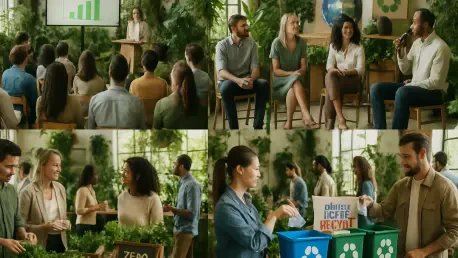I’m thrilled to sit down with Katarina Railko, a renowned expert in hospitality with a deep-rooted passion for sustainability. With years of experience in travel, tourism, and the entertainment sector, Katarina has become a leading voice in integrating eco-friendly practices into events, expos, and conferences. Today, we’re diving into her insights on driving sustainable change in the hospitality industry, inspired by recent developments at Rhubarb Hospitality Collection. We’ll explore how sustainability can be woven into operations, the challenges of balancing environmental goals with business needs, and the future of green initiatives in this dynamic field.
Can you share what excites you most about the growing focus on sustainability within the hospitality industry?
I’m genuinely thrilled to see sustainability take center stage in hospitality. It’s not just a trend; it’s a necessity. What excites me most is the opportunity to create experiences that are both memorable for guests and responsible toward the planet. I’ve seen firsthand how venues and events can reduce their environmental footprint while still delivering luxury and excellence. It’s about rethinking how we operate—whether it’s sourcing food locally or minimizing waste—and turning those efforts into a core part of the guest experience.
How have your past experiences in hospitality and events shaped your approach to embedding sustainable practices?
My background in travel and tourism taught me the importance of operational efficiency, which directly ties into sustainability. I’ve worked on large-scale events and conferences where we had to balance high expectations with limited resources. One project that stands out was an expo where we managed to cut energy use by 30% through smart planning and technology. That kind of success showed me that sustainable choices don’t have to mean sacrifice—they can enhance creativity and even save costs. It’s shaped my belief that every decision, from supply chains to staff training, can be a step toward a greener future.
What lessons have you learned about sustainable food systems that could transform the way hospitality businesses operate?
One of the biggest lessons I’ve learned is the power of going local and seasonal. Working with suppliers who prioritize ethical farming practices not only reduces carbon footprints but also elevates the quality of what we serve. I’ve seen how connecting with farmers and understanding their processes can inspire menus that tell a story. For hospitality, this means shifting away from mass-produced ingredients and focusing on farm-to-table approaches. It’s a win-win—guests get fresher, tastier food, and we support communities while cutting down on long-distance transport emissions.
When it comes to integrating sustainability into a company’s operations, where do you think the starting point should be?
I believe you have to start with a clear assessment of your current impact—look at energy use, waste streams, and sourcing practices. From there, I’d prioritize areas with the most immediate potential for change, like food and beverage. For example, auditing your menu to reduce food waste or switching to compostable packaging can make a big difference quickly. It’s also about setting achievable goals and communicating them clearly to your team. Without a baseline and a roadmap, it’s easy to get overwhelmed, so starting small but strategic is key.
How do you balance the push for environmental goals with the need to keep operations practical and profitable?
It’s definitely a balancing act, but I’ve found that sustainability and profitability aren’t mutually exclusive. For instance, reducing energy consumption or cutting down on single-use plastics often lowers costs in the long run. The trick is to focus on solutions that align with business goals—think reusable materials that enhance branding or energy-efficient equipment that saves money over time. Engaging partners and clients in the conversation is also crucial; when they see the value in sustainable practices, they’re more likely to support initiatives, even if there’s an upfront investment.
What’s your vision for getting staff and stakeholders excited about adopting a more sustainable operational culture?
It starts with education and empowerment. Staff need to understand why sustainability matters and how their daily actions contribute. I’ve organized workshops and hands-on training sessions in the past to show teams how small changes—like proper waste sorting or energy-saving habits—add up. For stakeholders, it’s about transparency and shared wins. Highlighting data, like how much waste we’ve diverted from landfills, builds trust and excitement. I also think storytelling helps—sharing the journey of a sustainable initiative can inspire everyone to get on board and feel part of the change.
Looking at ambitious goals like net zero emissions or waste minimization, which do you think poses the biggest challenge, and how would you tackle it?
I’d say achieving net zero emissions is often the toughest because it requires systemic change across so many areas—energy, transport, and even guest behavior. The challenge lies in both the scale and the coordination needed. My approach would be to break it down into phases, starting with energy audits to identify inefficiencies. Then, I’d explore renewable energy options and work with suppliers to reduce upstream emissions. Collaboration is key; partnering with like-minded organizations can help share the burden and innovate faster. It’s a long road, but every step forward counts.
What is your forecast for the future of sustainability in the hospitality and events industry?
I’m optimistic that sustainability will become non-negotiable in hospitality and events over the next decade. Guests are already demanding greener options, and businesses that don’t adapt will fall behind. I foresee a future where venues are designed with sustainability in mind from the ground up—think zero-waste kitchens and carbon-neutral operations as standard. Technology will play a huge role, from AI optimizing energy use to apps helping guests make eco-friendly choices. My hope is that the industry not only meets these expectations but leads the way in showing how business can be a force for good.









